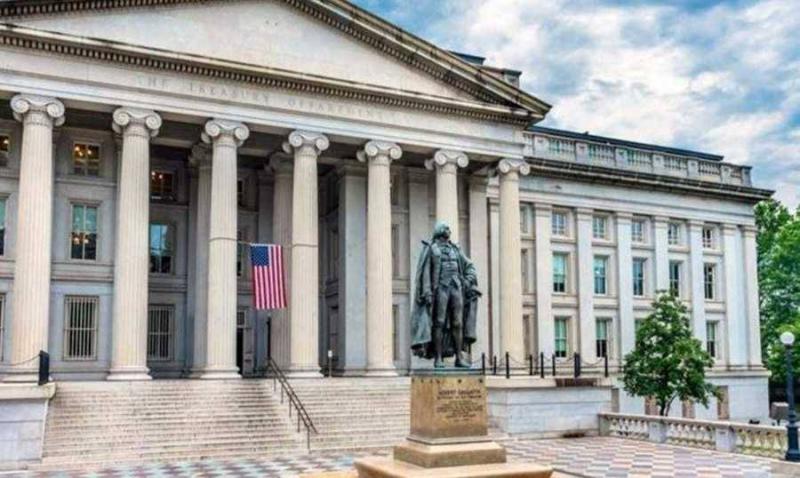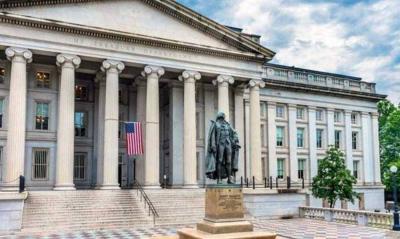The U.S. Treasury Department has placed Lebanon under close observation regarding illicit money movements and transfers, warning Lebanese authorities about the risk of the financial sector being used to fund Hamas, thereby enhancing its military and security activities. To this end, a senior U.S. Treasury official visited Beirut last week, meeting Lebanese officials to discuss concerns about the transfer of funds to Hamas via Lebanese territory.
A senior official at Lebanon's central bank confirmed to "Asharq Al-Awsat" that Jesse Becker, Deputy Assistant Secretary for Asia and the Middle East in the Office of Terrorism Financing and Financial Crimes, met on Thursday and Friday with Lebanese officials, including the Governor of the Central Bank, Dr. Wassim Mansouri, to discuss the U.S. Treasury's tracking of Hamas funding mechanisms, particularly following the Gaza war. The central bank official stated that Becker’s visit was part of a regional tour aimed at delivering clear messages about the U.S. administration's interest in monitoring illicit financial flows and the need to combat them.
The official, who requested anonymity, asserted that the Lebanese banking sector plays no role in the alleged funding operations, emphasizing that the U.S. focus is on financial institutions outside the banking sector that operate illegally. He noted that the Lebanese banking system fully adheres to international laws and avoids engaging in any activities that might expose it to U.S. or European sanctions. He added that American officials are well aware that the Central Bank of Lebanon implements these laws to the fullest extent and strives to adhere to the highest legal standards in the banking sector.
Lebanon's "Central News Agency" reported that a U.S. Treasury delegation held a meeting away from the media at the Lebanese Parliament with Ibrahim Kanaan, head of the Finance and Budget Committee, and MPs Fouad Makhzoumi, Ghassan Hasbani, and Ghada Ayoub. The delegation also met with the acting Governor of the Central Bank, Wassim Mansouri, in his office, though the date of the meeting was not specified.
According to Reuters, Deputy Assistant Secretary for Asia and the Middle East Jesse Becker informed Lebanese authorities of specific concerns regarding the flow of funds to Hamas through Lebanon and money from Hezbollah coming from Iran to Lebanon, and then to other regional areas, urging preemptive measures to combat this. The U.S. official indicated that these groups require a continuous flow of money to pay their fighters and conduct military operations, which they cannot achieve through other means. He reminded that Lebanon's compliance with global standards to combat money laundering and terrorist financing is essential for attracting investments from the U.S. and the rest of the world, aiding the country in overcoming its prolonged crisis.
Political and legal interpretations of Washington's interest in the Lebanese situation vary amid heightened confrontation with Israel. Former Justice Minister Professor Ibrahim Najjar downplayed the significance of these U.S. measures, stating in a statement to "Asharq Al-Awsat" that the American official's visit to Beirut falls within the routine procedures followed by the U.S. Treasury to prevent circumvention of sanctions imposed on Hamas, Hezbollah, and the Iranian Revolutionary Guard. He regarded the visit as a positive factor for Lebanon, indicating American interest in shielding the state, the Central Bank, and the banking sector from being implicated in these activities.
Becker's discussions in Beirut also focused on information available to the Treasury regarding the transfer of large sums of money from Iran to Syria and then to Lebanon, and from there to Hamas, whether through land routes or via unofficial money transfer institutions. "Asharq Al-Awsat" learned from sources accompanying Becker's visit that Lebanese officials assured the U.S. official that it is impossible for any money transfer operations to take place from Lebanon to Hamas in Gaza due to the absence of land borders between Lebanon and Gaza. They noted that smuggling money by air is extremely difficult, if not impossible, as transporting millions of dollars is subject to intense scrutiny and requires prior authorization that Lebanese authorities cannot grant.
Regarding the American message, Dr. Riyad Qahwaji, CEO of the Near East and Gulf Analysis Center (Enigma), stated that the U.S. message to Lebanon is part of Washington's efforts to significantly reduce Hamas's capabilities. Qahwaji confirmed to "Asharq Al-Awsat" that tracing Hamas's financial resources, regardless of their source, is crucial as Hezbollah, an ally of Hamas, operates in Lebanon and harbors the military leadership of the movement outside Gaza, raising suspicions about funds being funneled to Hamas through Lebanon. He viewed the timing as consistent with attempts to tighten pressure on the movement and undermine it. Qahwaji noted that Lebanon faces increasing international pressure as tensions rise with Iran in the region, adversely affecting the country.




